#gaelic kingdom
Text
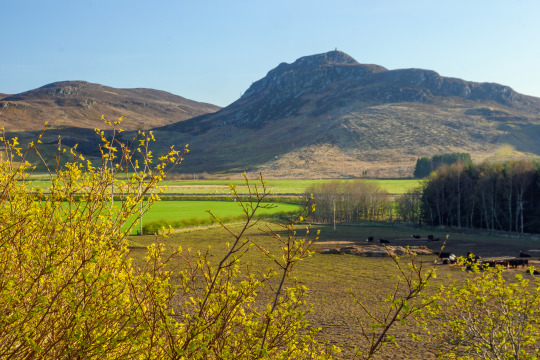
Let there be peace on earth and let it begin with me.
Photo: Cairngorms National Park, Scotland, UK
#scotland#uk#scottish highlands#united kingdom#spring#april#great britain#british isles#celtic#celtic europe#gaelic europe#highlands#cairngorms national park#peace#hope#inspiration#travel#tourism#adventure#explore#nature#the great outdoors#mountains#landscape#yellow flowers#see the world#european vacation#international travel#europe
28 notes
·
View notes
Text

An important point on intellectual snobbery, made by Alistair Moffat in his book “The Sea Kingdoms”
#reading#books#Celtic#Celtic languages#Gaelic#Welsh#mabinogion#fenian cycle#tain bo cuailnge#Alistair Moffat#sea kingdoms#intellectual snobbery#history
18 notes
·
View notes
Text

Sorry I'm super late for this but I did it just in time I wanted to draw this as Cookie Run Kingdom style and I did it! Happy Birthday, @littlestarcabin!!!
10 notes
·
View notes
Text
This is the vibe I want to embody with the whimsy side of dragon culture in dragons and kingdoms. This is their joy, their celebration, their 'it's been a long day and now we get to chill together and the youth still have some energy', 'I'm bored and I'm going to start tapping a rhythm and the rest will follow,' 'my friends and I choreographed a flight dance while the other half of us sing on the ground hey watch us,' 'I sing this around my grandmother and she smiles and sways and you can see what's left of her fangs.'
I cannot put this in the novel I cannot even translate the lyrics because I don't have them and I do not speak Welsh, but the ENERGY. Do you understand?? It is community it is joy it is freedom of sound and form.
#dragons and kingdoms#music#can crwtyn y gwartheg#sian james#welsh#im giving dragons a generally gaelic lilt more in the irish direction#but they are all connected#im not normal about this how can i be#Spotify
18 notes
·
View notes
Text
incredibly petty pet peeve i have is when writers recycle names from ancient or medieval civilizations for their fantasy kingdoms w no regard to if the cultural inspirations even match up. it's like an unspoken assumption that if they've never heard of these names before yoinking them from wikipedia then surely no one else has. such flat and disappointing worldbuilding
#''navarre'' used for a kingdom that is otherwise full of gaelic and celtic names when the historical navarre was fucking spanish#''illyria'' dropped into what is essentially fantasy britain when surprise surprise the historical illyria was in the balkans#im p sure i even saw another series using ''massedonia'' as an invented name#WAS IT EVEN A **LITTLE** CULTURALLY INSPIRED BY ANCIENT MACEDONIA??? NO!!!!!!!!#FUCK!!!!!!#textphelia
6 notes
·
View notes
Text
Do any Scottish tumblr users have a second?
May or may not need some help coming up with a title for a writing project. I’d like it to be in Scots or Gaelic or something to fit the theme, but online translators are useless.
If I could pick your brain you’d earn my eternal thanks!
2 notes
·
View notes
Text
youtube
Raise your horns into the air
There is plenty ale to share
All are welcome, take a chair
And sing a song loud and strong
Men of war and men of care
Maidens fierce and maidens fair
Raise your horns into the air
And sing a song loud and proud and strong
SKÅL!
SKÅL!
Sing loud
And strong
SKÅL!
SKÅL!
A toast
And a thundering song
At the end of the eve
We'll be welcome and warm
By a great roaring fire
Our voices a storm
In the warm timber halls
We will keep out the cold
As we bellow and belt out
These tunes full of soul
Raise your horns into the air
There is plenty ale to share
All are welcome, take a chair
And sing a song loud and strong
Men of war and men of care
Maidens fierce and maidens fair
Raise your horns into the air
And sing a song loud and proud and strong
SKÅL!
SKÅL!
Sing loud
And strong
SKÅL!
SKÅL!
A toast
And a thundering song
We're welcome and warm
Our voices a storm
Our voices
Our voices a storm
Raise your horns into the air
There is plenty ale to share
All are welcome, take a chair
And sing a song loud and strong
Men of war and men of care
Maidens fierce and maidens fair
Raise your horns into the air
And sing a song loud and proud and strong
SKÅL!
SKÅL!
Sing loud
And strong
SKÅL!
SKÅL!
A toast
And a thundering song
#The Sound of Silence (OOC)#She-Wolf of the North (About Aine)#Songs of War (Music | Aine)#((I've always thought of The Northern Kingdom as a mix of Nordic and Gaelic.))#Youtube
1 note
·
View note
Note
you’re attacking that neopagan kind of birthstone post about druid plants, but could you please elaborate or at least clarify the explicit trope that is being used that has been historically weaponized?
I used to spend about a good third of my time on this godforsaken website attacking that idea, but sure, I'll do it again. This will be a bit of an effortpost, so I'll stick it under the readmore
There is a notion of 'celts' or Gaels as being magicial and somehow deeply in touch with nature and connected to pre-Christian worldviews that the people who decided to make up the "Celtic tree astrology" used. This is also why Buffy used Irish Gaelic as the language of the demons, why Warhammer uses Gaelic as Elvish, why garbled Scottish Gaelic is used by Wiccans as the basis for their new religious construct, why people call themselves Druids to go an say chants in bad Welsh in Stonehenge, or Tursachan Chalanais, or wherever, etc etc. This stuff is everywhere in popular culture today, by far the dominant view of Celtic language speaking peoples. Made up neopagan nonsense is the only thing you find if you go looking for Gaelic folklore, unless you know where to look, and so on and so on. I could multiply examples Endless, and in fact have throughout the lifespan of this blog, and probably will continue to.
To make a long history extremely brief (you can ask me for sources on specifics, or ask me to expand if you're interested), this is directly rooted in a mediaeval legalistic discussion in Catholic justifications for the expansionist policies of the Normans, especially in Ireland, who against the vigourous protestation of the Church in Ireland claimed that the Gaelic Irish were practically Pagan in practice and that conquest against fellow Christians was justified to bring them in like with the Church. That this was nonsense I hope I don't need to state. Similar discourses about the Gaels in Scotland exist at the same time, as is clear from the earliest sources we have postdating the Gaelic kingdom of Alba becoming Scotland discussing the 'coastal Scots' - who speak Ynglis (early Scots) and are civilised - and the 'forest Scots' (who speak 'Scottis' (Middle Gaelic) and have all the hallmarks of barbarity. This discourse of Gaelic savagery remains in place fairly unchanged as the Scottish and then British crowns try various methods for integrating Gaeldom under the developing early state, provoking constant conflict and unrest, support certain clans and chiefs against others and generally massively upset and destabilise life among the Gaels both in Scotland and Ireland. This campaign, which is material in root but has a superstructure of Gaelic savagery and threat justifying it develops through attempts at assimilation, more or less failed colonial schemes in Leòdhas and Ìle, the splitting of the Gaelic Irish from the Gaelic Scots through legal means and the genocide of the Irish Gaels in Ulster, eventually culminates in the total ban on Gaelic culture, ethnic cleansing and permanent military occupation of large swathes of Northern Scotland, and the destruction of the clan system and therefore of Gaelic independence from the Scottish and British state, following the last rising in 1745-6.
What's relevant here is that the attitude of Gaelic barbarity, standing lower on the civilisational ladder than the Anglo Saxons of the Lowlands and of England, was continuously present as a justification for all these things. This package included associations with the natural world, with paganisms, with emotion, and etc. This set of things then become picked up on by the developing antiquarian movement and early national romantics of the 18th century, when the Gaels stop being a serious military threat to the comfortable lives of the Anglo nobility and developing bourgeoise who ran the state following the ethnic cleansing after Culloden and permanent occupation of the Highlands (again, ongoing to this day). They could then, as happened with other colonised peoples, be picked up on and romanticised instead, made into a noble savage, these perceived traits which before had made them undesirable now making them a sad but romantic relic of an inexorably disappearing past. It is no surprise that Sir Walter Scott (a curse upon him and all his kin) could make Gaels the romantic leads of his pseudohistorical epics at the exact same time that Gaels were being driven from their traditional lands in their millions and lost all traditional land rights. These moves are related. This tradition is what's picked up on by Gardner when he decides to use mangled versions of Gaelic Catholic practice (primarily) as collected by the Gaelic folklorist Alasdair MacIlleMhìcheil as the coating for Wicca, the most influential neo-pagan "religion" to claim a 'Celtic' root and the base of a lot of oncoming nonsense like that Celtic Tree Astrology horseshit that started this whole thing, and give it a pagan coat of paint while also adding some half-understood Dharmic concepts (three-fold law anyone?) and a spice of deeply racist Western Esotericism to the mix. That's why shit like that is directly harmful, not just historically but in the present total blotting out of actually existing culture of Celtic language speakers and their extremely precarious communities today.
If you want to read more, I especially recommend Dr. Silke Stroh's work Gaelic Scotland in the Colonial Imaginary, Dr. Aonghas MacCoinnich's book Plantation and Civility in the North-Atlantic World, the edited collection Mio-rún Mór nan Gall on Lowland-Highland divide, the Gaelic writer known in English as Ian Crichton Smith's essay A real people in a real place on these impacts on Gaelic speaking communities in the 20th century, Dr. Donnchadh Sneddons essay on Gaelic racial ideas present in Howard and Lovecrafts writings, and Dr. James Hunter's The Making of the Crofting Community for a focus on the clearings of Gaels after the land thefts of the late 18th and early 19th century.
@grimdr an do chaill mi dad cudromach, an canadh tu?
233 notes
·
View notes
Text

Here's Blaze! Her name is is Iris Flare, I started giving them just generalised names in English as I started incorporating more than Scottish folklore into these guys so it didn't make sense to have them all named in Gaelic, the Seasons travel constantly all over the world as they come and go with their seasons so I thought I'd be fun to assign different cultures to each of them!
Some more extensive lore under the cut!
Summer is the second most targeted Seasonal Spirit, but unlike Winter who is largely hated, Summer is regarded as a loved season and those challenging her often want to overthrow her place with malicious reasons, she has no gripe about fighting back but can often leave damage in her wake due to the nature of her flames. She does not see as much war as Winter but she fights just as fiercely. Summer is often compared to Winter but is adamant she does not agree with the ill-manner most refer to Winter with. They've never met but she is not disillusioned by the endless praise she receives against criticism against him. She firmly believes that all seasons are just as equal and should not be given favour over another. She hears about Winter mostly from the birds who migrate between their seasons, and she knows that if Winter was so bad then no bird would make the journey there willingly to avoid her own.
In contrast she is close to the other two seasons Spring and Autumn. She is the second youngest of the four, the order being Winter, Spring, Summer then Autumn. Her and Autumn are particularly close as she helped guide him through his first season when he was largely unprepared for it. Her and the other seasons took up the mantle willingly with an expectation on what their duty was. Iris used to be a mortal Royal who stepped up to inherit the responsibility when a rival kingdom set out to slay the previous Season, her family were historically friends of the Fae so she was asked for specifically and knew what she was getting into and did - and still does - take the responsibility very seriously. She doesn't often engage in festivities without request, but enjoys talking with every being of life regardless of status within a court (or outside one even).
Her flames are an indicator of her emotional state, they sometimes change colour and the temperature can range, so mostly she tries to keep calm and dim her flames especially around dry times in the season, her Sari is woven to be flame-resistant and prevents any accidental burns so she doesn't often take it off. Her jewellery are a close replica of the ones she wore as a mortal, it has been eons since so she pays tribute to the memories even as they grow faint. Ironically she mostly enjoys the rain when she can let her flames burn as bright as she likes. She enjoys flying as high as she can, where the only thing that can catch fire is herself, and the chill allows her to push her fire beyond what she could do safely on the ground.
280 notes
·
View notes
Text
UK accent bias, discrimination, minority languages and the question of the 'default, normal' english speaker
today I came across something overtly that is usually a covert problem, and I wanted to take a chance to talk about the questions it raises about what it means to be 'normal' and speak 'normal english' in an anglocentric, global world.
let's start at the beginning. I was aimlessly googling around and came across this article, discussing ergodic literature:
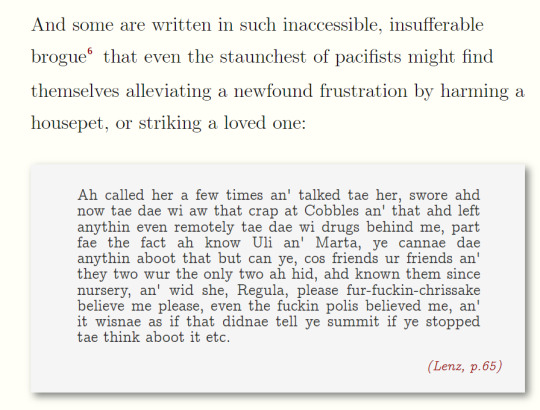
I hope that you will see what angered me right away, but if not:
brogue? inaccessible, insufferable brogue? that is so difficult to read you might want to relieve your frustrations by harming a housepet, or striking a loved one?
what????? the fuck??????
my dearly beloathed. this is not a made up sci-fi language. this was not written for your convenience.
this is the glaswegian dialect.
this is how it is written. scots, which is very similar to this, is a language whose speakers have been systematically taught to change and hide and modify their speech, to not speak it in the classroom, to conform. this is NOT comparable to any of the made-up dialects or ways of writing in cloud atlas or any other specularative fiction. the suggestion of ir is deeply insulting.
(the line between various 'dialects' and 'languages' I speak about here is by definition sometimes political, sometimes arbitrary, and often very thin. what goes for the glaswegian dialect here in terms of discrimination goes for scots in general - which is, in fact, even more 'inaccessible' than glaswegian because it has a greater quantity of non-english and therefore non-'familiar' words. speakers of different englishes will face more or less discrimination in different circumstances. caveat over.)
you can find it on twitter, in books, in poetry; and more than that, on the streets and in living rooms, in places that this kind of england-first discrimination hasn't totally eradicated.
an imporant note - this book in question is called Naw Much of a Talker, and it was written originally in Swiss-German and then translated into Glaswegian to preserve similar themes and questions of language and identity. rather than detracting from anything I'm saying, I think the fact this is a translated piece of fiction adds to it - it has literally been translated so it is more accessible, and the article writer did not even realise. it also highlights the fact as well that these are questions which exist across the globe, across multiple languages, of the constant tension everywhere between the 'correct' high language and the 'incorrect, backward' 'low' language or dialect. these are all interesting questions, and someone else can tackle them about german and swiss german -
but I am going to talk today about scots and english, because that is how the writer of this article engaged with this piece and that is the basis upon which they called it 'insufferable brogue', the prejudice they have revealed about scots is what I want to address.
so here, today, in this post: let's talk about it. what is 'normal' english, why is that a political question, and why should we care?
as we begin, so we're all on the same page, I would like to remind everyone that england is not the only country in the united kingdom, and that the native languages of the united kingdom do not only include english, but also:
scots
ulster scots (thank you @la-galaxie-langblr for the correction here!!)
scottish gaelic
welsh
british sign language
irish
anglo-romani
cornish
shelta
irish sign language
manx
northern ireland sign language
and others I have likely forgotten
there are also countless rich, beautiful dialects (the distinction between dialect and language is entirely political, so take this description with a pinch of salt if you're outside of these speaker communities), all with their own words and histories and all of them, yes all of them, are deserving of respect.
and there are hundreds and thousands of common immigrant languages, of languages from the empire, and of englishes across the globe that might sound 'funny' to you, but I want you to fucking think before you mock the man from the call centre: why does india speak english in the first place? before mocking him, think about that.
because it's political. it's ALL political. it's historical, and it's rooted in empire and colonialism and all you need to do is take one look at how we talk about Black language or languages of a colonised country to see that, AAVE or in the UK, multi-cultural london english, or further afield - the englishes of jamaica, kenya, india. all vestiges of empire, and all marked and prejudiced against as 'unintelligent' or lesser in some way.
and closer to home - the systematic eradication and 'englishification' of the celtic languages. how many people scottish gaelic now? cornish? manx? how many people speak welsh? and even within 'english' itself - how many people from a country or rural or very urban or immigrant or working class or queer background are discriminated against, because of their english? why do you think that is?
if you think that language isn't political, then you have likely never encountered discrimination based on how you, your friends, or your family speak.
you are speaking from a position of privilege.
'but it's not formal' 'but it's not fit for the classroom' 'but it sounds silly'. you sound silly, amy. I have a stereotypically 'posh' english accent, and I can tell you for a fact: when I go to scotland to visit my family, they think I sound silly too. but in the same way as 'reverse racism' isn't a fucking thing - the difference is that it's not systemic. when I wanted to learn gaelic, my grandmother - who speaks gaelic as her own native language - told me, no, you shouldn't do that. you're an english girl. why would you want to learn a backward language like gaelic?
discrimination against non-'english' englishes is pervasive, systematic and insidious.
it is not the same as being laughed at for being 'posh'. (there's more about class and in-group sociolinguistics here, but that's for another post)
and who told you this? where is this information from? why do you think an 'essex girl' accent sounds uneducated? why do you think a northern accent sound 'honest' and 'salt of the earth'? what relationship does that have with class? why does a standard southern british english sound educated and 'intelligent'? who is in charge? who speaks on your television? whose words and accents do you hear again and again, making your policies, shaping your future? who speaks over you?
think about that, please.
and before anyone says: this is so true except for X lol - I am talking about exactly that dialect. I am talking about that accent you are mocking. I am talking about brummie english, which you think sounds funny. I'm talking about old men in the west country who you think sound like pirates, arrrrr.
(actually, pirates sound like the west country. where do you the 'pirate accent' came from? devon was the heart of smuggling country in the uk.)
so. to this person who equated a book written in scots, a minority and marginalised language, to being 'insufferable, inaccessible brogue':
and also to anyone who is from the UK, anyone who is a native english speaker, and anyone abroad, but especially those of you who think your english is 'natural', who have never had to think about it, who have never had to code-switch, who have never had to change how they sound to fit in:
it might be difficult to read - for you. it might be strange and othering - to you.
but what is 'inaccessible' to you is the way that my family speaks - your english might be 'inaccessible' to them. so why does your 'inaccessible' seem to weigh more than theirs?
and why does it bother you, that you can't understand it easily in the first go? because you have to try? or because perhaps, just perhaps, dearly beloathed author of this article, after being catered to your entire life and shown your language on screen, constantly - you are finally confronted by something that isn't written for you.
and for the non-uk people reading this. I would like you to think very carefully about what a 'british accent' means to you.
there is no such thing. let me say it louder:
THERE IS NO SUCH THING AS A BRITISH ACCENT
there are a collection of accents and languages and dialects, each with different associations and stereotypes. the clever aristocrat, the honest farmer, the deceitful *racial slur*. there are accents, languages and dialects that you hear more than others because of political reasons, and there are accents, languages and dialects which are more common than others because of discrimination, violence and the path of history.
if you say 'british accent', we - in the UK - don't know exactly what you mean. much more than the US, because the english-speaking people have been here longer, we have incredibly different accents just fifty miles away from one another.
but we can guess. you probably don't mean my grandmother's second-language english - even though, by american conversations about race, she is the whitest person you could possibly find. you don't mean my brother, who sounds like a farmer.
you mean my accent. tom hiddleston's accent. benedict cumberbatch. dame judy dench. sir ian mckellen. and they are all wonderful people - but what sort of people are they, exactly? what sort of things do they have in common? why is it that you associate their way of speaking with all of the charming eloquence of 'dark academia' or high levels of education, and my family's english with being 'backward' or 'country bumpkins' or 'uneducated' or, more insidiously, 'salt-of-the-earth good honest folk'?
we are an old country with old prejudices and old classes and old oppression and old discrimination and old hate. my brother speaks with a 'farmer' west country accent; my aunt with a strong doric accent that most english people cannot understand; my father with a mockable birmingham accent; my grandmother with a gaelic accent, because despite the fact that she is from the UK, as scottish as you can get, english is not her first language.
these people exist. my grandmother is a real person, and she is not a dying relic of a forgotten time. her gaelic is not something to drool over in your outlander or braveheart or brave-fuelled scottish romanticism, the purity and goodness of the 'celt' - but there are fewer people like her now. and I would like to invite everyone to think about why that is the case.
if you don't know, you can educate yourself - look up the highland clearances, for a start, or look at the lives of anglo-romani speakers in the UK and the discrimination they face, or irish speakers in northern ireland. like many places, we are a country that has turned inward upon itself. there will always be an 'other'.
and then there's me. raised in southern england and well-educated and, however you want to call it, 'posh'. so why is it that it is my voice, and not theirs, which is considered typically british all over the world?
I think you can probably figure out that one by yourself.
when you talk about the 'british accent', this is doing one of two things. it's serving to perpetuate the myth that the only part of the UK is england, rather than four countries, and the harmful idea that it is only england in the UK that matters. (and only a certain type of people in england, at that.)
secondly, it serves to amalgamate all of the languages and accents and dialects - native or poor or immigrant or colonial - into one, erasing not only their history and importance, but even their very existence.
dearly beloathed person on the internet. I have no idea who you are. but the language scots exists. I'm sorry it's not convenient for you.
but before I go, I would like to take a moment to marvel. 'insufferable, inaccessible brogue'? what assumptions there are, behind your words!
is it 'insufferable' to want to write a story in the language you were raised in? is it 'inaccessible' to want to write a story in the shared language of your own community?
I don't think it is.
I think it takes a special sort of privilege and entitlement to assume that - the same one that assumes whiteness and Americanness and Englishness and able-bodiedness and cisness and maleness and straightness as being the 'standard' human experience, and every single other trait as being a deviance from that, an othering. that's the same entitlement that will describe Turning Red as a story about the chinese experience - but not talk about how Toy Story is a story about the white american middle class experience.
people do not exist for your ease of reading. they do not exist to be 'accessible'. and - what a strange thing, english reader, to assume all books are written for you, at all.
and despite the fact that the text that prompted this was written by one group of white people, translated into the language of another group, and critiqued by a third - this is a conversation about racism too, because it is the same sort of thinking and pervasive stereotyping which goes into how white people and spaces view Black language and language of people of colour around the world. it's about colonialism and it's about slavery and it's aboutsegregation and othering and the immigrant experience and it's about the history of britain - and my god, isn't that a violent one. it's inseparable from it. language is a tool to signify belonging, to shut people out and lock people in. it's a tool used to enforce that othering and discrimination and hate on a systemic level, because it says - I'm different from you. you're different from me. this post is focusing more on the native languages of the UK, but any question of 'correct language' must inevitably talk about racism too, because language is and has always been a signifier of group belonging, and a way to enforce power.
it is used to gatekeep, to enforce conformity, to control, to signify belonging to a particular group, to other. talking about language 'correctness' is NOT and never CAN be a neutral thing.
it reminds me of a quote, and I heard this second hand on twitter and for the life of me cannot remember who said it or exactly how it goes, but the gist of it was a queer writer addressing comments saying how 'universal' their book was, and saying - no, this is a queer book. if you want to find themes and moments in it that are applicable to your 'default' life, 'universals' of emotion and experience, go ahead. but I have had to translate things from the norm my entire life, to make them relatable for me. this time, you do the translation.
I do not speak or write scots or glaswegian, but I grew up reading it and listening to it (as well as doric and gaelic in smaller measures, which are still familiar to me but which I can understand less). for me, that passage is almost as easy to read as english - and the only reason it is slightly more difficult is because, predictably, I don't have a chance to practice reading scots very often at all. it isn't inaccessible to me.
(I was about to write: can you imagine looking at a book written in french, and scowling, saying, 'this is so insufferably foreign!' and then point out how ridiculous that would be. but then I realise - foreign film, cinema, lyrics increasingly in english, reluctance to read the subtitles, the footnotes, to look things up, to engage in any active way in any piece of media. this is an attitude which even in its most mockable, most caricature-like form, is extremely prevalent online. *deep sigh*)
because. what is 'inaccessible'? it means it is difficult for people who are 'normal'. and what is 'normal', exactly? why is a certain class of people the 'default'? could that be, perhaps, a question with very loaded and very extensive political, social and historical answers? who is making the judgement about what language is 'normal'? who gets to decide?
I'd also like to note that this applies to everyone. it doesn't matter if you are a member of an oppressed group, or five, or none, you can still engage in this kind of discrimination and stereotyping. my scottish family, who have themselves had to change the way they speak and many of them lost their gaelic because of it, routinely mock anglo-romani speakers in their local area. I have an indian friend, herself speaking english because of a history of violence and colonialism, who laughed for five minutes at the beginning of derry girls because the girls sounded so 'funny', and asked me: why did they choose to speak like that? my brother, who sounds very stereotypically rural and 'uneducated', laughs at the essex accent and says that he would never date a girl from essex. I had a classmate from wales who was passionate about welsh language rights and indigenous and minority language education but also made fun of the accent of her native-english speaking classmate from singapore. it goes on and on and on.
take the dialect/language question out of the topic, and I think this reveals a much broader problem with a lot of conversations about media, and the implicit assumptions of what being 'normal' [read: white, anglo-centric, american, male, straight, young, able-bodied, cis, etc] actually means:
if something is written about an experience I do not share, is it inaccessible? or is it just written for someone else?
so, please. next time you want to write a review about a dialect or language you don't speak, think a little before you open your mouth.
the rest of the world has to, every time.
#lingblr#langblr#scots#scots language#glaswegian#urghhhh#this was a bit of a rant and angry and entirely unresearched#if anybody wants to bring up any examples or correct me in any way#especially about names of other language groups that I'm not in (I just looked them up on wikipedia)#I will gladly edit and accept correct and conversation!#rarrrrghghghghghg#I am biting and killing
87 notes
·
View notes
Text

Oh, the summertime is coming
And the trees are sweetly blooming
And the wild mountain thyme
Grows around the blooming heather
Will you go, lassie, go?
And we'll all go together
To pull wild mountain thyme
All around the blooming heather
Will you go, lassie, go?
--"Wild Mountain Thyme" (Scottish/Irish Folk Song)
Photo: Loch Ness, Scotland
#scotland#uk#united kingdom#loch ness#scottish lochs#highlands#scottish highlands#spring#sailboat#sailing#lakes#yellow flowers#celtic europe#celtic#gaelic#great britain#british isles#europe#nature#natural beauty#god's creation#lochs#wild mountain thyme#travel#tourism#adventure#explore#european travel#see the world#world travel
16 notes
·
View notes
Text
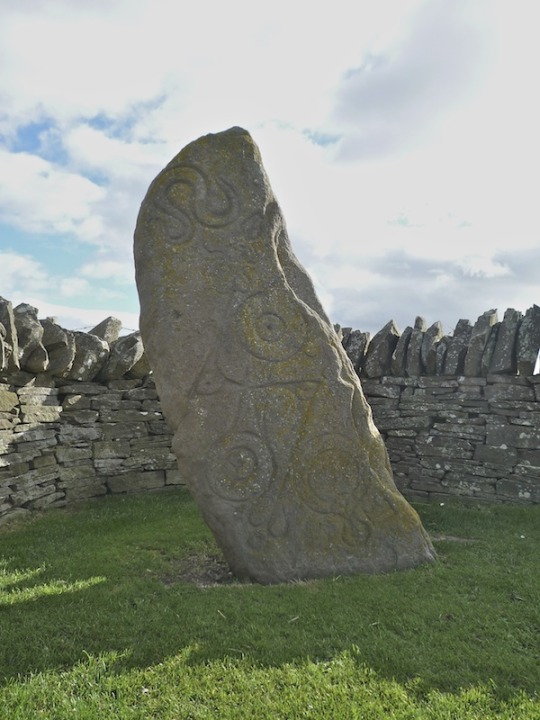
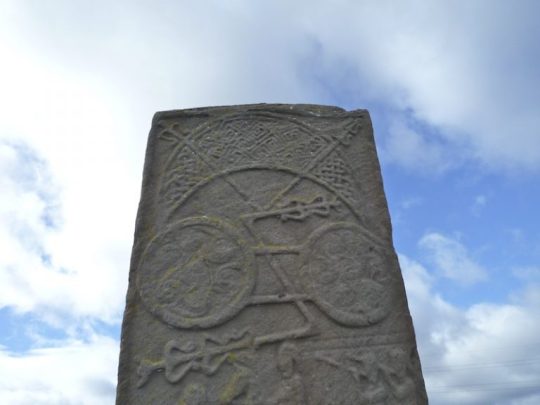
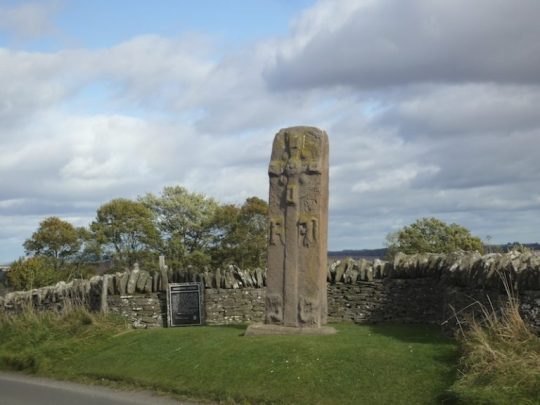
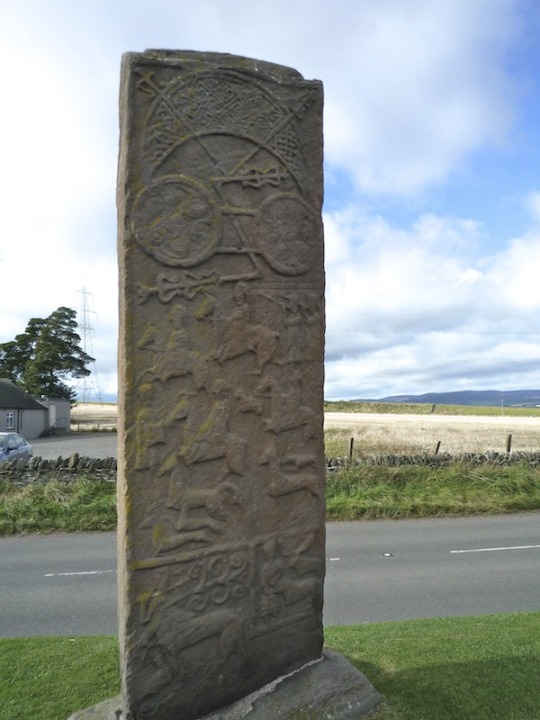

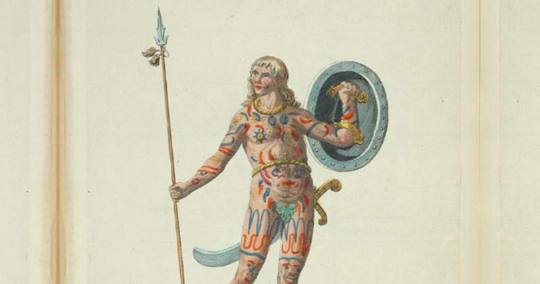
On 20th May 685 The Picts won a decisive Battle , in present-day Angus, known as The Battle of Dun Nechtain or Battle of Nechtansmere.
A wee bit longer post than I normally give you, but it is a great story, the first part tells us how a battle against The Angles helped shape the country we now know as Scotland, the second is a tale from the twentieth century, both stories are connected, read on and enjoy.........
Known as 'Picti' by the Romans, meaning 'Painted Ones' in Latin, these northern tribes constituted the largest kingdom in Dark Age Scotland. They repelled the conquests of both Romans and Angles, creating a true north-south divide on the British Isles, only to disappear from history by the end of the first millennium - swallowed whole by the history of another group, the Gaels. Together they created the Kingdom of Alba.
The Picts took part in one of the most decisive battles in Scottish history - the Battle of Dun Nechtain (Dunnichen). If the Picts had lost, Scotland might never have existed. For the Angles of Northumbria it was simply a disaster - ending their domination of Scotland.
The Battle of Dun Nechtain was fought on this day in 685 AD and is one of the best recorded events in Dark Age Scotland.
The Kingdom of the Angles under King Oswui had rapidly expanded north, moving their frontier from the River Forth to the River Tay. Since 653 AD many of the major groups of people in Scotland - Britons, Gaels and much of Pictland - had been subject to the overlordship of King Oswui. In 672 AD, after the death of Oswui, the Picts rose against their overlords, expelling Drust, their Northumbrian puppet king.
The new King of Northumbria, Ecgfrith, wasted no time in wreaking revenge on the Picts. The Picts were massacred at a battle near the town of Grangemouth, where the rivers Carron and Avon meet. According to Northumbrian sources, so many Picts died they could walk dry-shod across both rivers. By 681 AD Ecgfrith had founded a bishopric at Abercorn on the southern shore of the Forth - a symbol of Northumbria's secure grip over the Picts.
The defeated Picts took Bridei, son of Bili, as the king of a much depleted Pictland. King Bridei was actually the cousin of his mortal enemy, King Ecgfrith of the Angles, but, in true Dark Age fashion, this didn't diminish their mutual desire to destroy each other. An almighty battle was on the cards.
The Chronicle of Holyrood gives us an account of the battle: "In the year 685 King Ecgfrith rashly led an army to waste the province of the Picts, although many of his friends opposed it...and through the enemy's feigning flight he was led into the defiles of inaccessible mountains, and annihilated, with great part of his forces he had brought with him." However, we need to keep in mind this account was written hundreds of years after the event.
The Angles were advancing up Strathmore, probably aiming for the Pictish fortress of Dunnottar, when they fell into Bridei's trap. Sighting a Pictish warband, the Angles set off in pursuit, then, as they came over the cleft in Dunnichen Hill, they found themselves confronted by the main body of the Pictish army. Caught between the Picts and the loch below the hill, the Angles bravely faced their doom.
The politcal map was altered. The Picts, Gaels and many Britons were freed from Northumbrian overlordship. Gaelic poets as far away as Ireland celebrated the battle's outcome. The Pictish frontier returned to the River Forth near Edinburgh and the Bishop of Abercorn fled, never to return. The Angles never fully recovered as major force in Scotland.
It is no coincidence that the Picts mysterious disappearance occurs at the same time as the creation of the kingdom of Alba. For many years Gaelic influence in Pictland had been on the rise. The Gaelic religion of Christianity had spread throughout Pictish lands and with it many Gaelic traditions. Furthermore, through a mixture of conquest and inter-marriage Gaelic or Gaelicised royalty had succeeded to the Pictish throne (a notable example of this being Kenneth MacAlpin).
Finally in 878 AD the Pictish king, Áed, was murdered and replaced by a Gael - Giric. Giric accelerated the Gaelic takeover of Pictish politics during his reign making the Gaelic language and traditions commonplace. Even after Giric was finally deposed in 889 AD future Pictish kings such as Donald and Constantine embraced Gaelic culture. By 900 AD Pictland ceased to exist. The reign of Donald is listed in the Chronicle of the Kings of Alba as a king of Alba. Pictland and Dál Riata had gone and in their place Alba - a Gaelic word for Scotland - was created. In this simple listing in an obscure book Scotland has its origins.
Fast forward over 12 hundred years to the 2nd January 1950, and a woman called Miss E.F. Smith, described as a spinster, was driving home from a party in Brechin at about 2am. Her car had skidded into a ditch 2 miles outside the area due to the treacherous road conditions. She still had another 8 miles to go so she continued her journey on foot. She felt oddly nervous as she walked along the minor road west of the A932, then she saw a number of strange lights in the distance near Dunnichen Hill. Turning south towards the village, she noticed figure in the field to her right, part of Drummietermont Farm. Each figure carried a flaming red torch in its left hand and they seemed to be searching the ground for something.
Miss Smith then saw shapes on the ground exactly like dead bodies. The figure nearest to her stooped down and examined several of these ‘corpses’, turning them over and back again, as if looking for recognisable faces. This scene lasted for around ten minutes, with Miss Smith’s dog barking throughout. Eventually she simply walked away. She only realised that the whole event was peculiar when she woke up next day and thought about it. Later she gave details of the experience to the Society for Psychical Research. She reported that the searchers wore garb like body stockings, along with tunics and flattened oval helmets. They appeared to be moving around the edge of the vanished mere, the shape of which was later traced by archaeological investigation.
Although this post battle manifestation has not been repeated. some motorists passing through Dunnichen on misty nights have caught sight of fleeting human forms which vanish before their cars hit them.
There is some skepticism as to how real Miss Smith’s sighting was. She was travelling very late at night and had already walked a number of miles, not to mention suffering a trauma from skidding her car into a ditch. The vision could have been brought about as a result of exhaustion and the effects of the cold. However, the fact that it occurred at the exact site of the Battle of Nechtansmere seems to be too much of a coincidence and it is unlikely that the woman’s dog would react to something that occurred only in his owner’s mind.
The pictures are of Pictish stones from around Aberlemno that perhaps tell the story of the battle.
84 notes
·
View notes
Text
Rhys is a traditional *Welsh name
The Morrigan is one of the most well known celtic deities
The Fae are most commonly attributed to Irish folklore, albeit not exclusively.
Now, is anyone else uncomfortable with where the big bad kingdom is located on that very unoriginal map?
Disclaimer: no I do not condone or agree with the goal SJM gave to Hybern to make them the bad guys, I'm simply questioning why the bad guys were located there.
*Edit: Rhys is Welsh and not Gaelic, I was wrong.
28 notes
·
View notes
Text
Merlin Loregasm Rewatch S1E4
Hi Everyone! Welcome to my rewatch of Merlin focusing on the lore. I am a giant nerd so pretty excited about this. We're on THE POISONED CHALICE
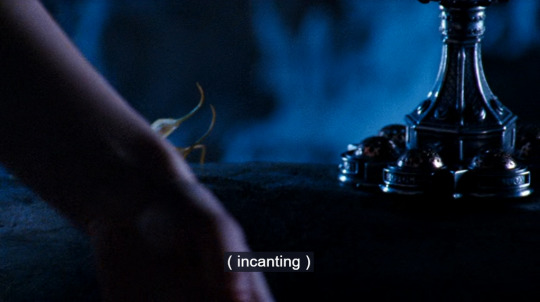
OKAY so @catsconflictscopicsandchamomile our resident Old English expert explained to me something really interesting. the spell used by Nimueh draws its power from the Spear-Danes, the semi pagan culture featured in Beowulf (Who had their own lake lady in Grendel's mother who was likely a priestess of the old religion And linguisticly called Disir)
There is more though The first lines of the spell also seem to be Nimue saying she owes her magic to the spear Danes (that Grendel the monster in Beowolf ate) At this point I'm wondering if its meant to establish she is saying HEY MY SPELLS ARE PAGEN
This will not be the only Beowulf reference in this episode. (Its never referenced or quoted after this episode)
I'm wondering if the translators threw this in as a joke or easter egg
Or in my freind's words "fuck it. lets canonize Beowulf in this universe real fast"
(Okay I just discovered one of their choices I'll talk about later and HOLY FREAKING SHIT)
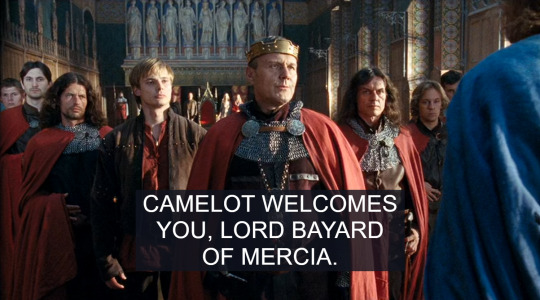
Mercia is traditionally thought of as a kingdom formed during the anglo-saxon settlement of Britain (Which occurs post Merlin acoirding to Merlin having saxons of enemies in later seasons) The historic king Arthur if he existed was said to have fought against the anglo saxons but this is just a footnote as we are focusing on Merlin Universe)
HOWEVER a 13th century text says "“Pagans came from Germany and occupied East Anglia, that is, the country of the East Angles; and some of them invaded Mercia, and waged war against the British.”
British here being Original pre-saxon inhabitents. SO it is possible that a Mercia existed before The Anglo-Saxons. This could also be the Historian using the name he knows. Bayard is not a recorded later King of Mercia either so good choice in name if we want him to be a Britonic king from a Mercia founded before the Anglo-Saxons apear.
Fun fact Mercia also resisted leaving paganism longer than any other Anglo-Saxon kingdom!
BUT Anyway in Merlin Mercia is a thing, Its ruled by Bayard, and its color is blue. It would be in the midlands of England most likely.
Also he was at war with Camalot, but now is not. I wonder if that has to do with Uther having not inherited but taking over the kingdom!
Uther: The treaty we sign today marks an end to war and the beginning of a new friendship between our peoples
I also think Uther as a peacemaker is interesting, especially as we see this more than once. It might be why some people view him as "A good king."
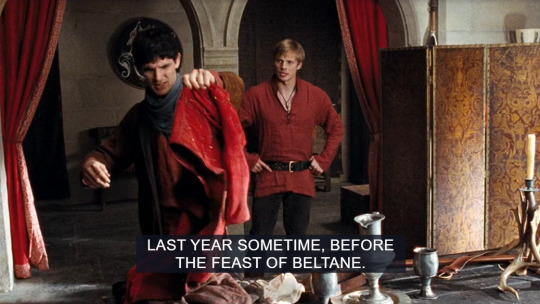
So this at first glance SEEMS like it hints more toward paganism. Beltane is a Gaelic May Day festival. But its renamed version May Day was not exactly Christianized.
See most other big Gaelic festivals (usually religious) Were kinda taken over by Christianity when it came. Yule became Christmas Samhain became All Saints Day (All Hollows Eve) ETC.
Beltane was also celebrated in some places ALONG with Christianity until the 1800s. (Scotland did this specifically)
In modern times Beltane is VERY Pagan. And it is very possible this hints further toward the Camalot is pagan or just nonreligious side of the entire debate. (Despite people using words like god or hell.)
But it's not quite as conclusive as many other type of references would be.
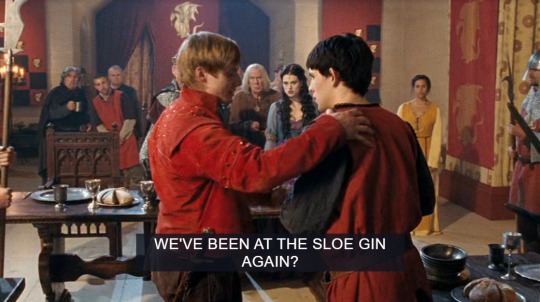
(For context despite it saying we've Arthur here is talking about Merlin, who just announced his cup was poisoned, exclusively which is interesting!) See slow gin is a type of alcohol made with juniper berries and blackthorn fruits. It was traditionally brewed (With a lot of home brewing) in October and November and used as a warming drink in the depths of winter.
AS you can tell this episode does not take place in winter. I think there are two possibilities for Arthur picking this drink specifically to mention despite that.
The first is that as a prince perhaps the drink is available to him year round if he wants it and he doesn't know that is not true of most people yet.
The second is he is so panicked at the prospect of the trouble Merlin is in his mind latched on to the first drink that popped into it.
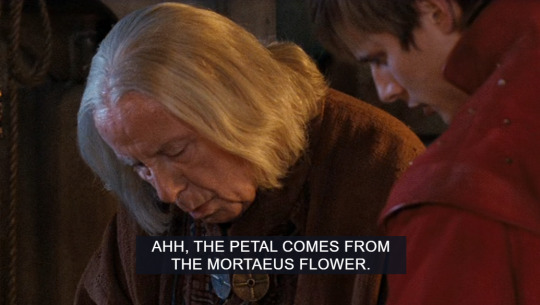
Okay, so Mort means death in Latin. And the ending suffix here Usually makes the word an adjective from proper or place names BUT often appears in flower naming. So basically this plant is named The "Death Flower" Flower or "Capital D Deathly" Flower
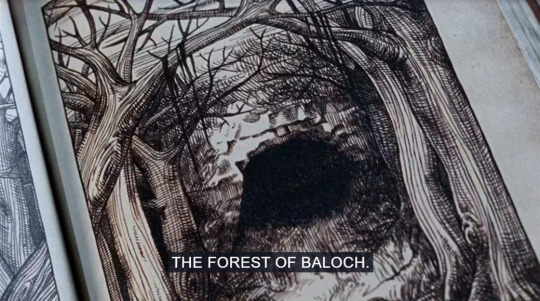
Gaius: it can only be found in the caves deep beneeth the forest of Baloch The flower grows on the roots of the Mortaeus tree.
Uh okay. THERE IS SOME SHIT GOING DOWN with this plant. First of all, flowers growing from the roots of a tree is just weird. flowers are basically there to attract things to pollinate a plant usualy. If a tree has flowers they do not grow from the roots.
Second of all its kinda weird for flowers or trees to grow in DEEP caves. Sunlight cannot read them there. I would give it a pass if it did not say deep because if there were cracks in the ceiling of the cave that could put light though.
It does kinda explain why they can ONLY be found there though. If its so odd and specialized it might be the only place it can grow.
This flower is either innately magical in some odd way or does not conform to evolution.
So at this point I am pretty sure it was bred/engineered/magiced into being but some sorcerer. Likely specifically for poisoning people. and that person wanted to limit the people who knew of it and thus kept it in once set of caves. BUT SOMHOW news got out about it.
Ok so I also looked up Baloch. In Welsh it can mean dig or sorry. In Irish it means boy and in scottish the same thing. So no info to be gleaned from that
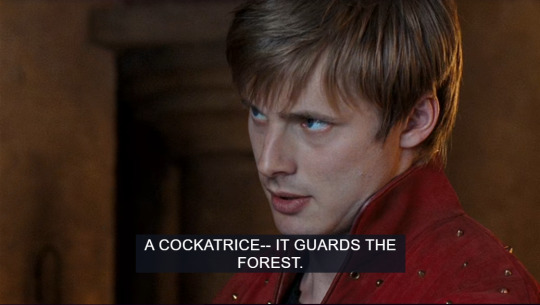
Gauis: A cockatrice-- it guards the forest. Its venom is extremely potent, a single drop would mean certain death.
OK first of all I'm doubling down on there being some past sorcerer, Because they were FOR SURE using these as guard dogs.
Second of all I LOVE Merlin paying fast and loose with magical creatures from folklore because I can too in my fics
A Cockatrice in folklore was a monster created when a toad or snake egg was hatched beneath a chicken. It could kill with a look, or a breath, or a touch, and was basically a two-legged dragonish creature with a rooster head.
In the Merlin world it is very diferant. We'll see one soon!
"Few who have crossed the mountains of Isgard in search of the Moraeus flower have made it back alive."
Yeah can't find any meaning behind the name Isgard! BUT HAVE I MENTIONED I THINK A SORCER ONCE LIVED IN THE CAVES/FOREST.
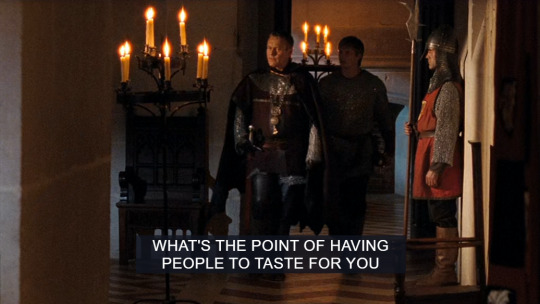
Okay I think this is a reference to the actual historical job of taster. Basically important people (ESP royalty) would hire someone to taste all their food before thay ate it. That way if it was poisoned the taster would die instead of them.
It was viewed as a pretty plum gig because poisoning didn't often happen (ESP if people knew there was a taster) and the taster got to eat REALLY good food and get paid for it.
I think its also an interesting character detail that while this kinda implies that Uther might have someone (At least for his private food and not banquets) We see multiple times that Arthur in fact does NOT. It is quite possible he managed to put his foot down and get out of this somehow because he believes it to be wrong. Which not gonna lie is a very Arthur thing to do.
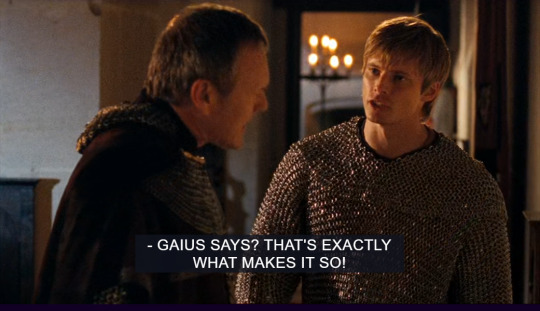
(Context: Arthur talking about how Gaius said they can save Merlin if they get the leaf so it is not a fools errand)
Waiiit is this trying to imply that Gaius was the one who brought up the idea that one could use the old religion to give Uther a son? I mean we knew he was the messenger. but HOLY SHIT. And if that is true, Uther somhow forgave him? Why would Uther forgive him? The only thing I can think is if Gaius talked about how magic had tricked him and gave Uther something else to blame. This is all conjecture though.
Uther could be referring on how Gaius is close to Merlin or something else. It just feels like it might be a nod at what all went down around Arthur's birth.
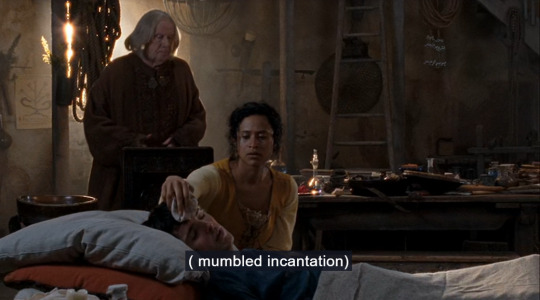
Okay so this is Merlin quoting Beowolf here. A Poem that is yet to be written down but might have had some oral tradition and actually takes place at the traditional time Arthur is said to have lived.
Merlin is basically talking about how Arthur/Beowolf is endowed with honnor.
This happens right after Arthur decides to ride out to save Merlin.
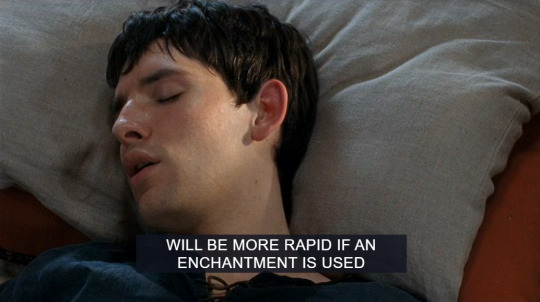
Magic Rule Established: Potions/Poisons can be more potent if magic is used in their preperation
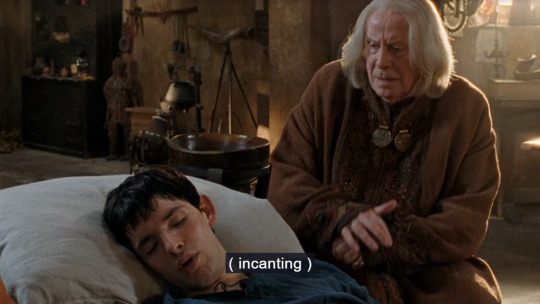
Okay MORE Beowolf
Merlin says Arthurs name then basically talks about a young man doing good deeds.
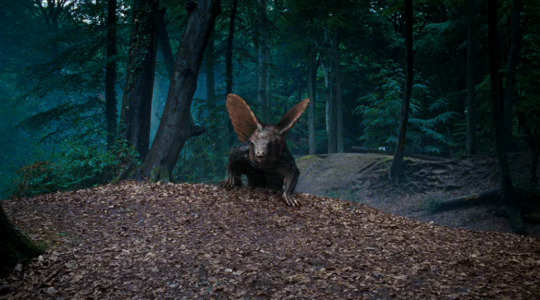
Playing hard and fast as I said. LOOK Dinosaur!
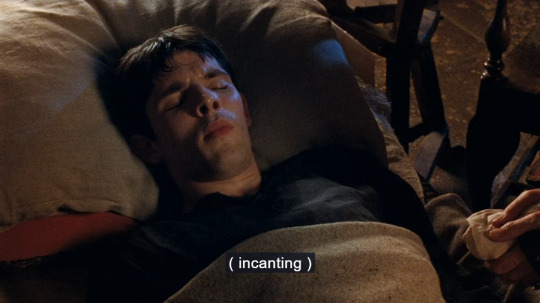
Okay so more Beowolf At this point I am 99.99% sure the people hired to write the spells at the time where having the time of their life.
Let me explain
This line talks about gifts of treasure (the light) he conjuress to help Arthur. Fine. BUT then it mentions Arthur being under his father's protection. Expect Merlinto protectg him.
The spell writers used a freaking old english poem to let Merlin call himself Arthur's "daddy" I am not sure what I am expected to do with this knowledge. (It might have been chosen so they could use the next line of the spell but THEY DID NOT HAVE TO DO THIS)
The next line (Which is actually also the next line in the poem) says something about how so that when Arthur is older his companions can stand with him when war comes.
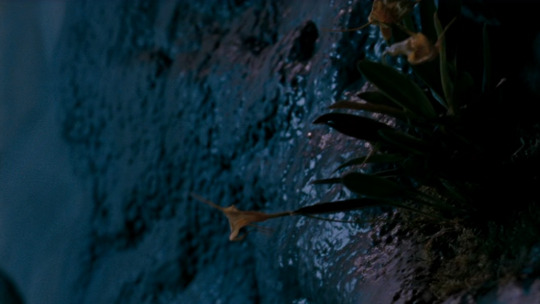
Okay so yeah turns out there is no tree or roots. I'm chalking this up to he said she said. STILL GOING WITH THE SORCERER.
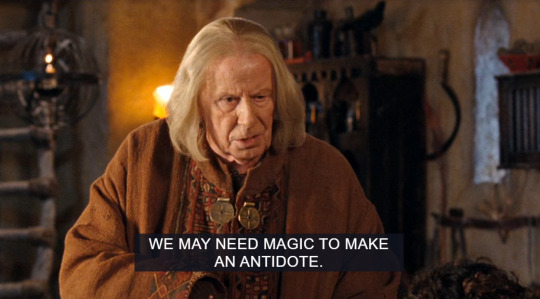
OKAY so it a potion is made using magic the antidote may ALSO need magic

Oh look our first hint Merlin is immortal. I find his brand of immortality intersting. HE CAN DIE he just comes back after a bit.
#lore#merlin lore#bbc merlin#merlin lorgasm rewatch#merlin lore rewatch#merlin rewatch#merlin bbc#merlin loregasm rewatch
44 notes
·
View notes
Text
does anyone know the name of this Mericcup fic???
hi, hello, i need help ヾ( ̄ω ̄; )
I've been looking for this Mericcup fanfic I read a while back for ages and I'm about to tear my hair out cause I can't find it and I forgot what it was titled (╥﹏╥)
The plot was basically that Hiccup somehow ends up in DunBroch? I forget how but he's kinda stranded and needs to get back to Berk but can't. Merida finds him but the two of them can't communicate because of the language barrier (Hiccup was speaking some variant of Old Nordic/Scandinavian from Merida's POV, and I think Merida was speaking Gaelic from Hiccup's? the fic was in english tho). The fic essentially has the two of them falling for each other as they each learn more about each other, until they both know enough to properly talk to each other. And at that point the two are smitten and decide to get married. The fic is mostly from Merida's POV, and there was this one scene that's stuck in my brain where Merida is sewing her honeymoon nightgown herself with her mom's help because it's a wedding tradition in her kingdom and asking what the point of all the little details are if no one is gonna see them and her mom says her husband is going to see them while Merida gets flustered.
The fic was really good but for the life of me I can't frickin' find it
halp pls
EDIT: I FOUND THE FIC!!! :D :D :D
#mericcup#mericup#merricup#hiccup x merida#merida x hiccup#merida and hiccup#please help i'm gonna lose my mind at this rate#kweeny speaks
27 notes
·
View notes
Text

O’Sullivan, Keith, and Valerie Coghlan. Irish Children’s Literature and Culture: New Perspectives on Contemporary Writing. 2011. Routledge.
The quote from O'Sullivan and Coghlan 2011 captures the very tension that makes it interesting to think about the specific Irishness of Artemis. "While Artemis is explicitly represented as a scion of an Irish criminal dynasty, inhabiting a modernized Norman castle, [...] all sense of the national and the local have been eradicated [from the series]. Speech rhythms are entirely mid-Atlantic. No Hiberno-English or Wexford usages are evident. Landscape has become virtual".
Artemis' Irishness may never be in question, but the nature of that Irishness is striking!
“Madam,” [Artemis] said. “I have a proposition for you.”
The figure’s head wobbled sleepily.
“Wine,” she rasped, her voice like nails on a school board. “Wine, English.”
Artemis smiled. [...]
“Irish, actually. Now, about my proposition?”
“The healer shook a bony finger craftily. “Wine first. Then talk.”
“Butler?”
The bodyguard reached into a pocket, and drew out a half pint of the finest Irish whiskey”
[Eoin Colfer, Artemis Fowl: Book 1]
In the first book, Artemis is mistaken by the sprite for English, right as she asks for wine. Artemis corrects her, stating that he is Irish; notably, the alcohol he offers is not the wine the sprite requested, but (the finest) Irish whiskey.
IMO this interaction is what O'Sullivan and Coghlan 2011 alludes to: Artemis Fowl is a series that asserts its Irishness... but it is also true that the prose is "mid-Atlantic" and time spent in Ireland* is usually limited to the setting of the Manor (*one should note that this should also be contextualized by the series' publication during the Celtic Tiger)
The history of the Butlers and the Fowls provides some context for the Irishness of Artemis. “The first record of this unusual arrangement was when Virgil Butler had been contracted as servant, bodyguard, and cook to Lord Hugo de Folé for one of the first great Norman crusades"; the Fowls and Butlers arrive in Ireland as Anglo-Norman conquerors.
The Manor is the site of much of the first book's conflict (and one of the main places, albeit a fictional one, in Ireland where the series lingers): “The original Fowl castle had been built by Aodhán Fowl in the fifteenth century overlooking low-lying country on all sides.”
The fifteenth century saw the reconquest of Ireland under Henry VIII; Ireland was changed from a lordship (where the island was ruled by the King of England and controlled by loyal Anglo-Norman lords between 1171-1542) to a full Kingdom.
Furthermore, with this excerpt about Aodhán Fowl, we must note that the Manor was built in Dublin. During the 15th century, Dublin was located in the Pale; it was the base of English rule in Ireland following the reconquest. By the Tudor period, there was intermarriage between the Gaelic Irish aristocracy and the Anglo-Norman lords, and many of the Anglo-Normans had become "Gaelicized", assimilating into Irish culture and increasingly less "English". These descendants were seen as the "Old English" of Ireland, in contrast to the "New English" of Ireland of the Tudor invasion. Thus, there is a specificity to the time in which Aodhán Fowl lived and built the Manor.
And in thinking of the history of conquest and colonization of Ireland, this is the history that a family like the Fowls would likely have to have had. I'm not sure I have additional notes on which to end this post, but I welcome additional thoughts on the subject!
19 notes
·
View notes